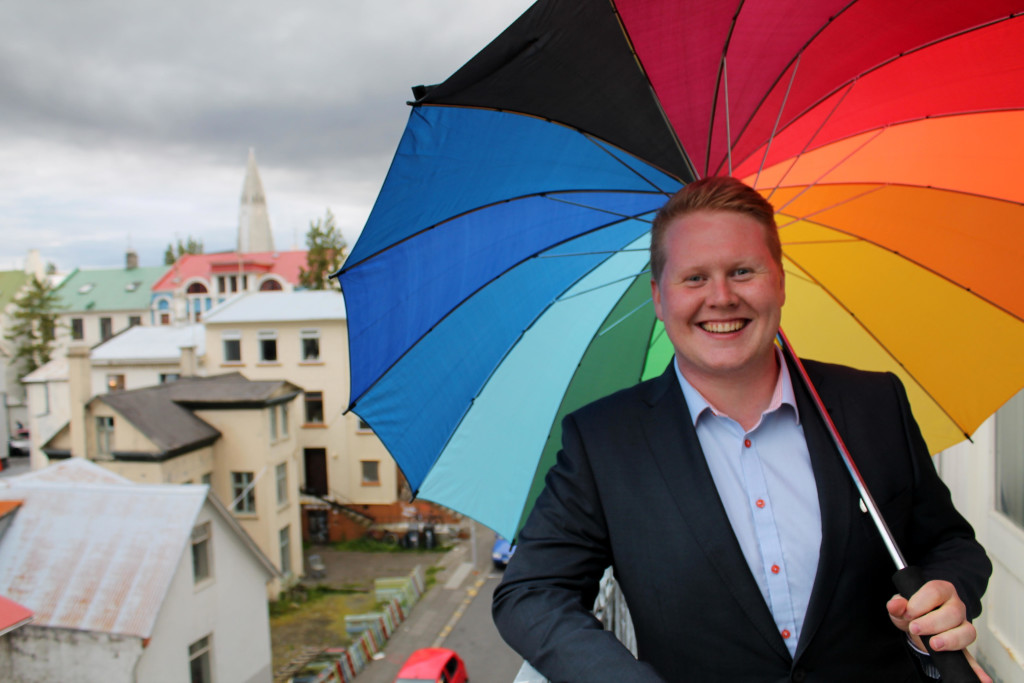GayIceland’s Yaz Duncan sits down with Gunnlaugur Bragi, President of Reykjavik Pride, to talk rainbow capitalism, Pride as a protest and Icelandic attitudes towards LGBT+ rights.

Since 2018 Gunnlaugur has also been serving as a deputy city councillor in Reykjavik where he, amongst other things, am on the planning and transport committee, humans rights, democracy and innovation committee and anti-violence committee.
Once upon a time queer people could be arrested for wearing two items of clothing not commonly associated with their gender, spaces for queer people were raided because it was illegal for ‘homosexuals’ to congregate and the postmaster blocked queer publications under obscenity laws.
The 1968 Stonewall Riots in New York galvanised the LGBT+ community to organise and in 1970 the first Pride marches were held in major cities in the USA. Pride has a political and civil rights background, but what started as a riot has become, some argue, a colourful celebration.
In recent years, Pride parades have attracted the attention of businesses who are keen to show their support, or at least secure the disposable income of queer people.
At this year’s London Pride for example, it was difficult to ignore the volume of corporations represented in the parade. There has been a lot of discussion about ‘rainbow capitalism’ where companies are exploiting Pride and the LGBT+ community for their own profits and make no effort seriously engage with issues affecting queer people.
In contract, Reykjavik Pride has banned advertising in its parade, according to the President of Reykjavík Pride, Gunnlaugur Bragi. “Back in 2000 when the first Pride parade was organized in Reykjavik the organisers had already seen the parades getting more commercial so they decided to ban corporations from advertising in the Reykjavik Pride Parade. Today that’s one of the two main rules regarding joining our parade – no advertising from corporations and every act in the parade needs to have a clear message or meaning.”
“… the pride parade is crucial to keep the focus on what matters – that is celebrating what we have achieved and addressing what still needs to be done.”
He says that the issue of rainbow capitalism and pink washing is being discussed more and more. “The line between support and pink washing can be thin. Of course, it creates more visibility and expands the celebrations when companies dress up colorfully during Pride but what if that’s their only support or even a way to hide their real hostile attitude towards the LGBT+ community?
It is my belief that our ban towards advertising in the pride parade is crucial to keep the focus on what matters – that is celebrating what we have achieved and addressing what still needs to be done.”
So what can companies do to meaningfully support Pride?
For businesses that are serious about making things better for their own employees and want to make a commitment to social responsibility regarding LGBTQ+ issues, Gunnlaugur argues that before they celebrate Pride and take the credit for doing so, a real commitment needs to be made.
“Financial support and cooperation is something that most LGBT+ organisations need. Corporations also need to focus on how they can actually become LGBT+ friendly, how to create a safe workplace for LGBT+ people and how to provide good service for LGBT+ customers.
When businesses have taken actual steps to support and respect the LGBT+ community they can proudly dress up for Pride and tell the world what they’ve done so far.”
Why do we still need Pride?
So, if even banks and other traditional corporations seem keen to celebrate the LGBT+ community publicly in Iceland, why do we still need Pride? Around the world Iceland is seen as a beacon of progressiveness when it comes to LGBT+ matters, but Gunnlaugur says that there is still some way to go.
“No matter how progressive or liberal a country is we need Pride everywhere. If history has taught us anything it’s the fact that rights we’ve obtain by fighting can very easily be taken away from us again.
That’s why we have to remember and understand where we’re coming from. We have to know the history and keep on reminding our hetero- and cis-normative society about our existence and rights.
Even though we’ve come a long way here in Iceland there’s still work to do and the need for visibility is obvious. We still hear about LGBT+ teenagers being kicked out of their homes for being who they are and research show that LGBT+ youth are more likely to self-harm than heterosexual peers.
Violent behaviour and hate speech against LGBT+ people and various forms of micro aggression is still a part of our everyday life. So far little to nothing has been talked about LGBT+ friendly workplaces in Iceland and how LGBT+ peoples experience their possibilities compared to heterosexual peers.
The list of possible improvements and topics we need to discuss is probably close to being endless.”
Is Pride drifting to far away from its roots?
As well as concerns of companies exploiting the goodwill of Pride, there has also been growing concern amongst LGBT+ commentators that Pride is a colourful party and is drifting too far away from the its political roots.
“It’s very important to remember that the first Pride was a riot. In my belief we need to know where we’re coming from to be able to understand where we’re going,” says Gunnlaugur.
“The history of Pride was started by people that had had enough and were brave enough to stand up and demand change. We need to honour these brave pioneers by keeping their memory alive but mostly by keep up the work they started.”
The Future of Pride in Reykjavik
Public perception of Pride in Iceland is growing, with over a third of the population of the country now attending the parade. The number of people attending has grown exponentially since the first event in 1978, Hinsegin helgi í Reykjavík (a queer weekend in Reykjavik) which attracted 1,500 people.
“I want to believe that this is a sign that the Icelandic nation is liberal and progressive and that the welcoming and celebratory atmosphere the parade creates has something to do with it,“ says Gunnlaugur.
With the popularity and participation in Pride events growing in Iceland, the future of the event seems positive, as a vehicle to continue to raise LGBT+ issues, he adds.
“My belief is that we are on the right track. Reykjavik Pride should continue to emphasise on providing various events that honour queer culture, diversity and human rights as well as continue to raise new topics regarding LGBT+ people that needs to be discussed.
It’s very important to use the visibility and momentum during Pride to point out important facts, open discussions and of course to take a clear stand against all human rights violations around the world.”
Reykjavik Pride takes place 8-17 August 2019. More information can be found on it’s website: https://hinsegindagar.is/en/


